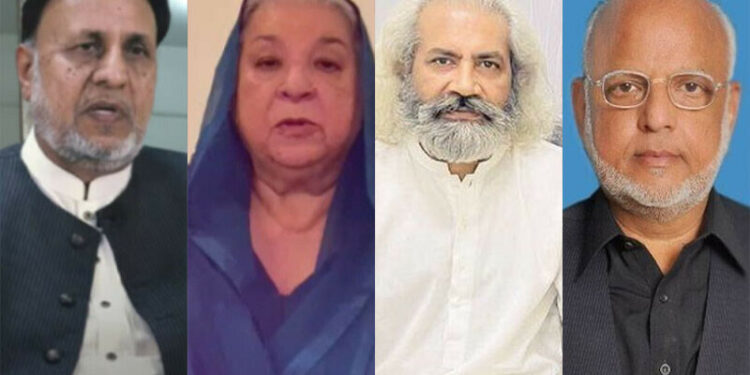Introduction
In a significant legal development linked to the violent incidents of May 9, 2023, the Lahore Anti-Terrorism Court (ATC) has ordered the confiscation of properties belonging to senior Pakistan Tehreek-e-Insaf (PTI) leaders Dr. Yasmin Rashid, Umar Sarfraz Cheema, Mian Mahmood-ur-Rashid, and Ijaz Chaudhry. The court’s decision comes in two high-profile arson attack cases registered in the aftermath of the unprecedented unrest that gripped Pakistan following the arrest of PTI founder Imran Khan.
This ruling marks another chapter in the legal proceedings against PTI leaders accused of playing a role in orchestrating, inciting, or participating in violent protests, which resulted in damage to both public and private property.
Background: The May 9 Incident
The events of May 9, 2023, are widely regarded as one of the most volatile political episodes in Pakistan’s recent history. The unrest broke out after the dramatic arrest of former Prime Minister Imran Khan by paramilitary forces in Islamabad. Following the arrest, widespread protests erupted across major cities, including Lahore, Karachi, Peshawar, Rawalpindi, and Multan.
In Lahore, the protests quickly turned violent, leading to attacks on government installations, military facilities, and public infrastructure. One of the most high-profile incidents included the vandalism and arson attack on the Corps Commander House (Jinnah House). Several PTI leaders and supporters were accused of instigating these actions, either directly or indirectly.
The government labeled the events as “acts of terrorism”, prompting the registration of multiple cases under Pakistan’s anti-terrorism laws.
Details of the Court’s Decision
Cases and Police Stations Involved
The latest ATC ruling pertains to two separate arson cases registered at:
- Shadman Police Station, Lahore
- Sarwar Road Police Station, Lahore
These cases accuse the defendants of:
- Inciting violent protests
- Participating in mob actions
- Damaging public and private property
- Interfering with government operations and security installations
Property Confiscation Orders
The court directed that all movable and immovable properties belonging to the four PTI leaders be identified, frozen, and confiscated under relevant provisions of Pakistan’s criminal and anti-terrorism laws. This includes:
- Residential properties
- Agricultural land
- Commercial assets
- Bank accounts
Confiscation is intended both as a punitive measure and to ensure that the accused cannot evade the court’s authority by disposing of their assets.
Jail Warrants and Sentencing
In addition to property seizure orders, the ATC issued jail warrants for convicted individuals linked to the same cases. The court instructed the Superintendent Jail to:
- Ensure the prisoners serve their sentences without delay
- Transfer them to designated jails in accordance with court directives
- Report back on the implementation of orders
The detailed judgment, released a day earlier, outlines the evidence, witness testimonies, and legal provisions invoked to reach the decision. While the complete text of the judgment has not yet been made public, court sources suggest it contains strong language condemning the violence of May 9 as “unprecedented, unlawful, and deeply damaging to the state’s authority.”
Profiles of the Accused PTI Leaders
Dr. Yasmin Rashid
A senior PTI leader and former provincial minister for health in Punjab, Dr. Yasmin Rashid is a prominent political figure and long-time close associate of Imran Khan. Known for her vocal political activism, she has been accused by authorities of delivering speeches that allegedly incited protesters on May 9. She has consistently denied any wrongdoing, calling the cases “politically motivated.”
Umar Sarfraz Cheema
A former governor of Punjab and staunch PTI loyalist, Umar Sarfraz Cheema has been at the forefront of PTI’s political campaigns in the province. Authorities allege that Cheema played a logistical role in organizing protest gatherings that later turned violent.
Mian Mahmood-ur-Rashid
A senior PTI leader and former Punjab Minister for Housing, Mian Mahmood-ur-Rashid has also been implicated in several post-May 9 cases. The court documents accuse him of being present at protest sites and encouraging demonstrators.
Ijaz Chaudhry
A veteran politician and PTI office-holder, Ijaz Chaudhry is facing allegations of coordinating protest activities in Lahore. He has repeatedly denied these accusations, claiming they are part of a wider “political victimization” campaign.
Government’s Stance
The government has defended its actions, stating that property confiscation and harsh sentencing are necessary to deter similar violent incidents in the future. Officials argue that May 9 was not just a political protest but an “attack on the state’s writ and security institutions.”
Interior Ministry representatives have stated that no one—regardless of political influence—will be above the law when it comes to acts deemed as terrorism or sedition.
PTI’s Response
In contrast, PTI leaders have rejected the court’s verdicts, claiming the legal process is being weaponized to “crush the party before the next general elections.” Party spokespersons insist:
- The accused leaders were either not present at the scene or were peacefully demonstrating
- The evidence presented in court is based on fabricated witness statements and edited video footage
- These cases are part of a larger crackdown against PTI following Imran Khan’s ouster
Legal Context: Property Confiscation under Anti-Terrorism Laws
In Pakistan, property confiscation in terrorism-related cases is permitted under the Anti-Terrorism Act (ATA) of 1997. Section 11E allows the state to freeze or seize assets if there is credible evidence linking them to acts of terrorism, incitement, or facilitation.
The process involves:
- Court order following investigation
- Identification of assets by law enforcement
- Execution of confiscation by revenue and police authorities
While this provision is meant for combating terrorism financing, its use in politically sensitive cases often sparks debate over its potential misuse for political suppression.
Broader Implications
The Lahore ATC’s decision is likely to:
- Heighten political tensions ahead of upcoming elections
- Increase international scrutiny over Pakistan’s human rights and political freedoms
- Potentially discourage public protests due to fear of asset seizure and lengthy jail terms
Analysts believe the ruling may also serve as a precedent for future cases, where political leaders accused of inciting violence could face not only imprisonment but also the loss of personal wealth and property.
Conclusion
The confiscation orders against Yasmin Rashid, Umar Sarfraz Cheema, Mian Mahmood-ur-Rashid, and Ijaz Chaudhry underscore the seriousness with which the Pakistani judiciary and government are treating the May 9 incidents. While authorities frame these actions as essential for maintaining law and order, critics see them as part of a broader political crackdown aimed at sidelining PTI’s leadership.
As the legal battle continues, the outcome of appeals and future trials will determine whether these confiscations become permanent punishments or are overturned in higher courts.

























